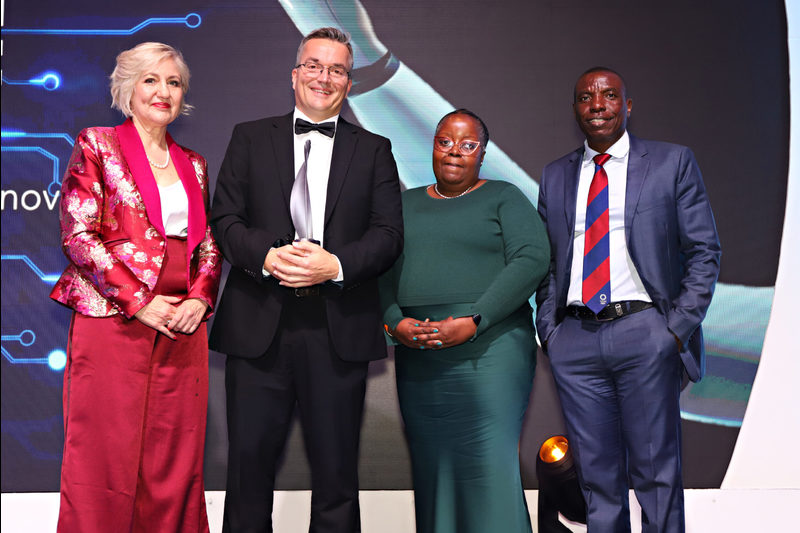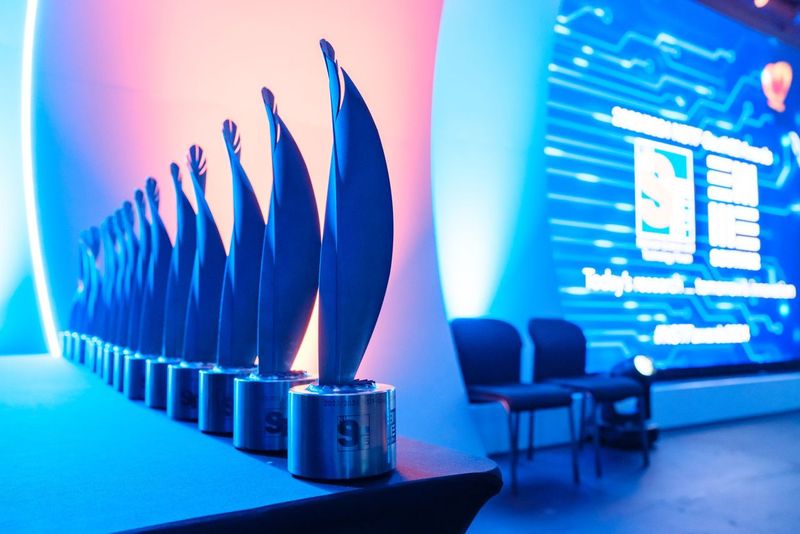Top honours for leading radio astronomy big data analysis
05 August 2024 | Story Ayanda Mthethwa. Photo NSTF. Read time 4 min.
The Inter-university Institute for Data Intensive Astronomy (IDIA) received the 4IR Special Annual Theme Award from the National Science and Technology Forum (NSTF)-South32 Awards. This accolade highlights IDIA’s pivotal role in advancing data-intensive radio astronomy research within South Africa's universities.
Established by founding director Professor Russ Taylor, IDIA is a partnership between the Universities of Cape Town (UCT), Western Cape (UWC), and Pretoria (UP), and initially included North-West University (NWU). IDIA works in close collaboration with the South African Radio Astronomy Observatory (SARAO), which operates the MeerKAT telescope. The institute is the leading group supporting data-driven research in radio astronomy in South Africa and emerged out of the necessity to support South African astronomers in the era of the Square Kilometre Array (SKA) telescope.
The NSTF-South32 Awards are South Africa's most prestigious in science, engineering, and technology (SET). They were broadcast live from venues in Johannesburg and Cape Town on 11 July 2024, under the theme “Fourth Industrial Revolution (4IR) in South Africa.”

The MeerKAT telescope in the Northern Cape will be integrated into what will become the largest radio telescope in the world, the Square Kilometre Array (SKA), offering unparalleled observational capabilities. The SKA project aims to deploy hundreds of radio telescopes in unique configurations, enabling comprehensive space surveillance at unprecedented speeds, while generating vast amounts of data for processing.
"Breakthroughs in SKA science are achieved by those who can handle the data and this is where IDIA excels," stated the institute’s interim director, Professor Patrick Woudt, during his acceptance speech at the awards ceremony.
“Transformational SKA science will be done by those individuals and teams who can effectively work with the data.”
Empowering research with Ilifu
At the core of IDIA's groundbreaking technology lies Ilifu, a state-of-the-art research cloud facility revolutionising data processing in astronomy and bioinformatics. This facility was designed and implemented by Professor Rob Simmonds (UCT), IDIA’s associate director for New Technologies. According to Professor Simmonds, “Ilifu offers best in class services with federated web-based access. It utilises the SAFIRE system operated by TENET – the South African research and education network – to securely connect to a user’s home or the institution’s identity providers. This improves security and requires less system support overhead.”
Through Ilifu, IDIA empowers researchers to work with the enormous datasets generated by MeerKAT. Currently, IDIA supports five of South Africa’s eight major MeerKAT survey projects, driving forward groundbreaking research on the formation and evolution of galaxies. This innovative support technology has not only enhanced scientific discovery but has also placed South Africa at the forefront of astronomical research.
"Ilifu supports hundreds of postgraduate students and emerging researchers, preparing future SKA science leaders. Transformational SKA science will be done by those individuals and teams who can effectively work with the data," said Professor Woudt.
IDIA is also committed to public engagement and societal development, offering educational initiatives in cloud-based big data science. "Our goal is to lower the entry barrier for newcomers by providing access to cloud technology, fostering inclusivity and participation in data science and computing projects," added Dr Sally Macfarlane, IDIA’s associate director of Development and Outreach.
Innovating at IDIA
The Cube Analysis and Rendering Tool for Astronomy (CARTA), enables astronomers worldwide to visualise and analyse complex data from instruments like the Atacama Large Millimeter/submillimeter Array (ALMA), MeerKAT, and soon, the SKA. This has been developed by an international consortium spearheaded by IDIA. “CARTA is now being used by thousands of astronomers worldwide to analyse and image chiefly radio astronomy data from [these] new, very large instruments,” said Kechil Kirkham, IDIA’s project manager.
IDIA expects to become the platform of choice for most MeerKAT, and in future, SKA observations, for the majority of radio astronomy researchers and their collaborators.
UCT shines at NSTF Awards
This year, six UCT researchers were finalists in various categories, a testament to their exceptional talent amidst strong competition.
 This work is licensed under a Creative Commons Attribution-NoDerivatives 4.0 International License.
This work is licensed under a Creative Commons Attribution-NoDerivatives 4.0 International License.
Please view the republishing articles page for more information.
Research & innovation





































